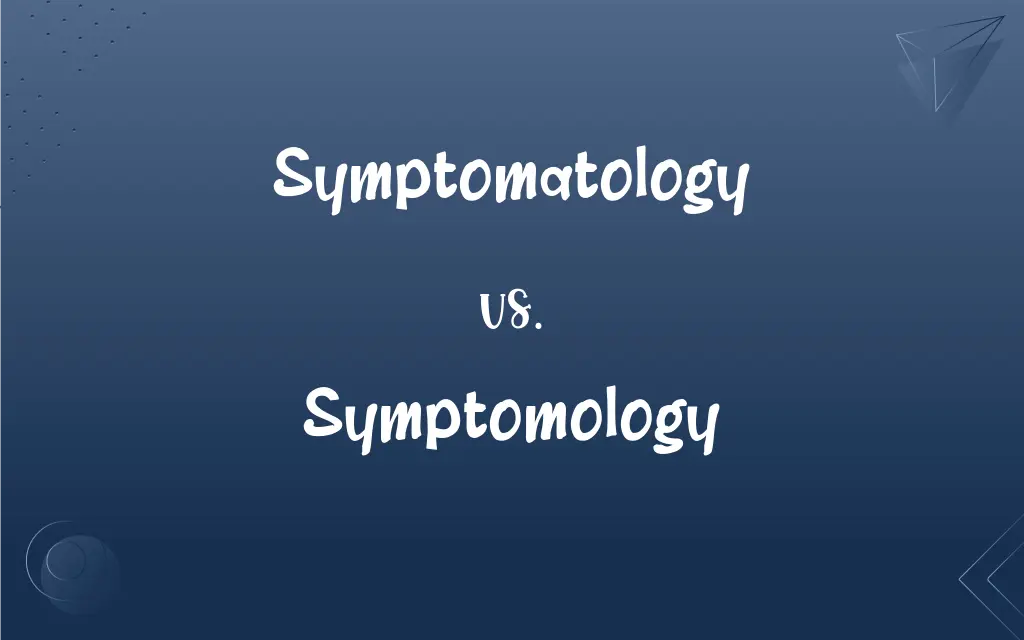Symptomatology vs. Symptomology: What's the Difference?
By Aimie Carlson & Janet White || Updated on March 3, 2024
Symptomatology is the systematic study of symptoms and their significance in understanding diseases, focusing on patterns and correlations. Symptomology, often used interchangeably, more generally refers to the description and analysis of symptoms.

Key Differences
Symptomatology is a medical term that refers to the systematic study of symptoms, their classification, and their relevance in diagnosing diseases. It involves analyzing the characteristics, patterns, and progression of symptoms to understand the underlying conditions better. Symptomology, on the other hand, is often used interchangeably with symptomatology, but it traditionally has a more general meaning. It refers to the description and analysis of symptoms, but without necessarily implying the systematic study or the broader scientific approach that symptomatology entails.
The distinction between the two terms can be subtle and is not always strictly adhered to in medical literature or practice. However, when the distinction is made, symptomatology is seen as the more academic and research-oriented term, implying a deeper and more systematic investigation into symptoms and their meaning in the context of diseases. Symptomology, while still important in medicine, is considered to be a more general and less systematic approach to understanding symptoms.
In clinical practice, understanding symptomatology is essential for diagnosis and treatment planning. A thorough grasp of symptom patterns, their onset, and how they relate to each other can provide vital clues to the underlying disease processes. This knowledge helps clinicians differentiate between diseases with similar symptoms and tailor treatments to address the specific needs of patients.
Despite the differences, both terms highlight the importance of symptoms in medical diagnosis and patient care. Whether through the detailed study of symptomatology or the broader analysis of symptomology, recognizing and understanding symptoms is a fundamental aspect of healthcare. It ensures that patients receive accurate diagnoses and appropriate treatments for their conditions.
Comparison Chart
Definition
The systematic study of symptoms for diagnosing diseases.
The description and analysis of symptoms, often used interchangeably with symptomatology.
ADVERTISEMENT
Focus
Patterns, correlations, and significance of symptoms in disease contexts.
Individual symptoms and their analysis.
Approach
Systematic and research-oriented.
General and descriptive, less systematic.
Importance in Medicine
Crucial for diagnosis, treatment planning, and understanding disease processes.
Important for symptom identification and initial analysis.
Usage
More academic, used in detailed medical research and diagnostics.
More general, used in broader medical discussions and descriptions.
Symptomatology and Symptomology Definitions
Symptomatology
Symptomatology is often associated with medical research and studies.
Symptomatology research has led to breakthroughs in understanding rare diseases.
ADVERTISEMENT
Symptomology
Despite subtle differences, the terms are often used synonymously.
In clinical practice, symptomology and symptomatology are frequently conflated.
Symptomatology
It examines how symptoms relate to each other and to diseases.
Through symptomatology, doctors can identify disease patterns early on.
Symptomology
Symptomology focuses on the examination of symptoms individually.
Symptomology helps in the initial assessment of a patient's condition.
Symptomatology
It categorizes symptoms to better understand diseases.
Symptomatology classifies symptoms into groups for easier disease identification.
Symptomology
It provides a broad overview of symptoms without deep analysis.
Symptomology is often the first step in medical evaluations.
Symptomatology
Symptomatology involves a comprehensive analysis of symptoms and their implications.
Symptomatology is key in linking clusters of symptoms to specific diseases.
Symptomology
Symptomology may not always follow a systematic research method.
Symptomology might rely more on clinical observations than structured studies.
Symptomatology
This field is essential for accurate disease diagnosis and treatment.
Advanced symptomatology enables precise diagnosis even in complex cases.
Symptomology
It aids in the early stages of identifying possible diseases.
Symptomology is crucial when a patient first presents with unexplained symptoms.
Symptomatology
The medical science of symptoms.
Symptomology
(informal) symptomatology
Symptomatology
The combined symptoms of a disease.
Symptomatology
(uncountable) The science that studies the symptoms of diseases.
Symptomatology
(countable) The aggregate of symptoms of a particular disease.
Symptomatology
The doctrine of symptoms; that part of the science of medicine which treats of the symptoms of diseases; semeiology.
FAQs
What role does symptomatology play in medical research?
Symptomatology is important in medical research for understanding disease mechanisms and developing diagnostic criteria.
Is symptomatology important in medical diagnosis?
Yes, symptomatology is crucial for diagnosing diseases, as it involves a detailed analysis of symptom patterns and their significance.
Are there specific methods used in symptomatology?
Symptomatology employs various methods, including statistical analysis and pattern recognition, to study symptoms and their relations to diseases.
Can symptomology be used interchangeably with symptomatology?
While often used interchangeably, symptomology is traditionally less systematic and more focused on general symptom description.
How does symptomology contribute to patient care?
Symptomology aids in the initial assessment and identification of symptoms, which is the first step in diagnosing and treating patients.
What is the significance of patterns in symptomatology?
Patterns in symptomatology help clinicians identify disease syndromes and differentiate between conditions with similar symptoms.
What is the main difference between symptomatology and symptomology?
Symptomatology is the systematic study of symptoms in relation to diseases, focusing on patterns and correlations, while symptomology generally refers to the description and analysis of symptoms.
How does symptomology help in clinical practice?
Symptomology provides a foundational understanding of symptoms that guides initial clinical evaluations and hypotheses about potential diseases.
What impact does symptomatology have on personalized medicine?
Symptomatology contributes to personalized medicine by enabling tailored treatment plans based on individual symptom patterns.
Can a non-specialist use symptomatology effectively?
While non-specialists can apply basic principles of symptomatology, effective use often requires medical training and experience.
Is symptomology sufficient for diagnosing complex diseases?
Symptomology is a starting point, but complex diseases often require more detailed investigations and symptomatology for accurate diagnosis.
Can symptomology be applied in mental health?
Yes, symptomology is applied in mental health to describe and analyze psychiatric symptoms, aiding in the diagnosis of mental disorders.
How do cultural factors influence symptomatology?
Cultural factors can influence the perception and reporting of symptoms, making cultural competence important in symptomatology.
Does symptomology involve the treatment of symptoms?
Symptomology primarily focuses on the identification and analysis of symptoms, while treatment decisions are based on the underlying diagnosis.
What challenges exist in symptomatology research?
Challenges in symptomatology research include the subjective nature of symptoms and the complexity of correlating symptoms with specific diseases.
How does symptomology impact emergency medicine?
In emergency medicine, symptomology helps quickly identify critical symptoms that require immediate intervention.
What advancements are expected in the field of symptomatology?
Advancements in genomics, bioinformatics, and artificial intelligence are expected to enhance the precision and application of symptomatology.
How does symptomatology integrate with other medical disciplines?
Symptomatology integrates with various medical disciplines by providing a foundational understanding of symptoms that informs specialized diagnostic and treatment approaches.
How has symptomatology evolved with modern medicine?
Symptomatology has evolved to incorporate advanced diagnostic technologies and molecular biology, enhancing understanding of symptom-disease relationships.
Are there digital tools that aid in symptomatology?
Yes, digital health tools and apps are increasingly used to track and analyze symptoms, aiding in symptomatology.
About Author
Written by
Aimie CarlsonAimie Carlson, holding a master's degree in English literature, is a fervent English language enthusiast. She lends her writing talents to Difference Wiki, a prominent website that specializes in comparisons, offering readers insightful analyses that both captivate and inform.
Co-written by
Janet WhiteJanet White has been an esteemed writer and blogger for Difference Wiki. Holding a Master's degree in Science and Medical Journalism from the prestigious Boston University, she has consistently demonstrated her expertise and passion for her field. When she's not immersed in her work, Janet relishes her time exercising, delving into a good book, and cherishing moments with friends and family.































































